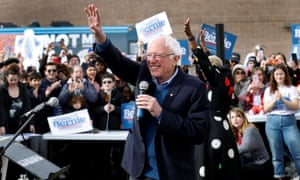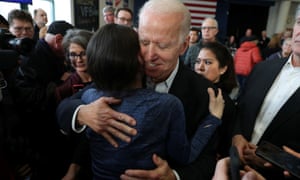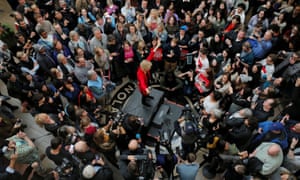Democrats
Democratic presidential candidates makes their final pitch to the state but midwesterners are still torn over who to support in race against Donald Trump

Photograph: Mike Segar/Reuters
Many Iowans look forward to their state’s caucuses, the quadrennial ritual of gathering at schools, churches and libraries on a wintry night to formally kick off the presidential primaries. This year, however, some Democrats can’t wait for them to be over.
“Nerve-racking,” “overwhelming,” and a “little scary,” is how Dyese Matthews, 24, a graduate student at Iowa State University, described the pressure of being among the first Americans to make their choice in the months-long nominating process to choose the party’s standard-bearer.
“Hillary Clinton was supposed to beat Donald Trump,” she said at an event for Massachusetts senator and presidential candidate Elizabeth Warren in Ames during the weekend. “We never thought we would be in this position.”
Iowans are known for taking seriously their responsibility as host of the “first-in-the-nation caucuses”. But this year, many have been consumed by the desperate desire to defeat a president they view as uniquely dangerous and unfit for office.

Already facing questions about whether a state with a population that is 90% white should play such an outsized role in an increasingly diverse Democratic party, many Iowans say they feel added pressure – and anxiety – this year to “get this right”.
“For Democratic voters in Iowa, it feels like an existential crisis,” said David Redlawsk, a political scientist at the University of Delaware who is in Iowa studying the 2020 caucuses. “As much as people here have always cared a lot about policy and a lot about values, it really feels different this time.”
Q&AWhat are the Iowa caucuses?

On 3 February, the midwestern state of Iowa will kick off the long process of choosing the Democratic party’s presidential nominee, who will take on Donald Trump in the US election in November.
Most US states hold primary elections, in which voters go to a polling place, mail in their ballots or otherwise vote remotely. But a handful of states hold caucuses – complicated, hours-long meetings with multiple rounds of balloting until one candidate emerges as victor.
Both Democratic and Republican caucuses will take place on 3 February. But because Trump doesn’t face any serious Republican challengers, all eyes will be on the Democratic contest.
Put simply, Iowans aged 18 (at the time of the November 3 election) and over who are registered Democrats will gather in caucus sites (school gyms, churches, community halls) in their designated precinct, and vote with their feet by splitting into groups based on their preferred candidate.
Once voting is over at a caucus site, the support for viable candidates (those with more than 15% of the votes) is translated into a number of “state delegate equivalents”. That result is used to calculate the number of national delegates each candidate receives. National delegates eventually choose the nominee at the Democratic convention in July.
On the night, the candidate with the most SDEs is considered the winner.
Leading Democratic presidential candidates descended on the state this weekend in a final push before the caucuses. Polls show no clear frontrunner and voters still torn over who to support.
A Monmouth University poll released last week found that roughly half of likely Democratic caucus-goers say they are still open to changing their minds when they show up on Monday evening.
Having a large number of undecided Iowans at this stage is not unique to 2020, said Patrick Murray, who runs the polling institute at Monmouth. But he added: “The fact that we don’t have any frontrunner is an indication that folks are not quite sold on which candidate is the most electable.”
A relentless focus on electability – in other words, the safest choice in a contest against Trump – has turned politically savvy Iowans into full-blown pundits. And with 11 candidates still in the race, there’s plenty to discuss.

Is Joe Biden, 77, too old? Is Pete Buttigieg, 38, too young? Is self-described democratic socialist Bernie Sanders too liberal? Is former Harvard law professor Elizabeth Warren too risky (often a polite way of asking if a woman can win)?
“I’ve really been more conflicted this year than ever before,” said Shireen Carter, an attorney in Norwalk who described the decision as “heart versus head”.
She plans to caucus for Warren but worries about whether the party would align behind an unabashed progressive. “There’s always more responsibility because we are first in the nation. But this year has felt like …” she paused and let out a long sigh. “There’s just an additional layer of pressure.”
The candidates are not making the choice any easier.
“Folks, every four years democracy begins in Iowa,” Biden told an audience in Muscatine last week. “You start the clock running – you make judgments about who among us gets to go out of the gate. You narrow down the field for the rest of the country.”
Sanders told Iowans that at Monday’s caucuses their choice would have significant bearing on the “most consequential election in modern American history, if not all [of] American history”.
Q&AWhy are the Iowa caucuses important?
On 3 February, voters in the midwestern state of Iowa will kick off the long process that will eventually choose the Democratic party’s presidential nominee, who will take on Donald Trump in November’s US election.
The primaries and caucuses are a series of contests, in all 50 US states plus Washington DC and outlying territories, by which each party selects its presidential nominee.
Iowa is extremely influential in US elections because, since 1972, it has voted first. After months of campaigning, this will be the first chance to see what support each of the presidential candidates actually have among voters.
Winning Iowa matters because it can give candidates a huge boost in momentum and name recognition before the other states cast their votes. Underdogs can triumph, and frontrunners can fall. Since 2000, every Democratic winner of the Iowa caucuses has gone on to win the party’s nomination.
However, Iowa only has a population of around three million people, who are 90% white, which has prompted criticism that its influence in US elections is outsized.
Karen Cooney, a volunteer with the Muscatine Democratic party, said her advice to friends gripped by indecision has been to do what Iowans always do: meet the candidates, shake their hands and ask them questions.
But she understands that’s easier said than done. Cooney has a short list of three candidates she’s considering. She said: “A woman told me yesterday: ‘I just can’t wait for Monday night to be over. Then I’ve made my choice and I’m done. I don’t have to think about it any more.”
Not all voters are undecided – far from it. Manysigned “commit to caucus” cards at candidate events this weekend. Others committed to their candidate weeks or even months ago. And some have been waiting for this moment since 2016.

“It’s going to be so good this year,” Julie Van Dyke, 53, of Iowa City said after a Sanders campaign event with surrogates Michael Moore and Naomi Klein. “Last time was intimidating and ugly, but this time he’s going to win. It’s going to be amazing.”
This isn’t just a feeling, she said – she was actively growing the movement.
“Last night I talked a Republican into caucusing for Bernie,” she said. “It took me two hours but it was worth it.”
Iowans will make their voices heard on Monday night, starting at 7pm CST, at the more than 1,600 precinct locations across the state, from the Mississippi River to the Missouri River – and even some in other states and countries. Then, for the next several hours they will play what is effectively a high-stakes game of musical chairs until a winner is declared.
“It’s fun to have it happen,” said Lynette Marshall, who attended a Warren event in Iowa City but had not yet made up her mind. “But we’re ready to move on.”
Source: Elections - theguardian.com




